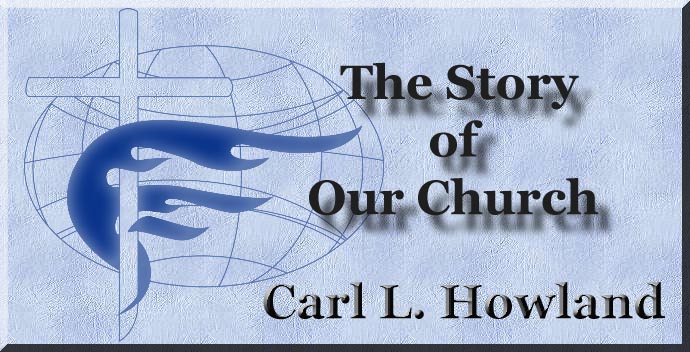
The Story of Our Church
By Carl L. Howland
Chapter 1
1. Before Methodism
The enemies of Christianity have been many. The Jews of Jerusalem who had brought about the death of Christ continued the work of persecution, but the result was as when one whips the fire, causing sparks to fly for new kindling everywhere. If the followers of Christ must needs flee from their homes, they still carried with them the Word of life. As the destruction of Jerusalem (A. D. 70) made continued Jewish persecution impossible, the Roman governors and government took up the fagot and sword to crush the infant church. Nevertheless, those of the new faith were soon found in Caesar’s household. The catacombs gave shelter to those who would pay any price for peace and heaven. Later when a degenerate “Christianity” in the form of the Roman Church provided a way whereby men could be good churchmen and still live wicked lives, when Rome used the prison, the rack and the fire against those who worshiped according to their own consciences, and when the Word of God was snatched from the people and burned, the Waldenses, the Huguenots and other similar groups, often in hiding places, kept the faith alive and preserved and read the Scriptures. Many of them suffered the loss of all temporal things, and some went to their death for the preservation of the faith and the salvation of their souls. Then came Huss, Luther, Wycliffe, Tyndale, Fox, Knox, and a score beside, who were famous as “reformers,” contending for salvation by faith, proving the divine authority of the Scriptures and giving the written Word to the people. For their good works they were often hated. For the good they did some paid with their lives. Out of their works came the “reformation,” with “Protestants” broken from the Roman Catholic Church. Among these were the Lutherans of Germany and the Anglican Church in England. While the Reformation on the continent had a firm spiritual base in the convictions of Luther, Calvin and their associates, the final break from Rome in England was probably more because of the controversy between Henry VIII and the Pope over the king’s desire for a divorce than for any righteous reason. However, there were strong spiritual forces which acted as salt in the new Anglican Church. Both in the established church and among the various dissenters there were those who had personal and living faith in Jesus Christ. But the Reformation in England was partial and was more a rejection of the ecclesiastical and political power of the Pope than a search for spiritual religion. During the succeeding two hundred years there was no improvement. Of the religious condition in England at the beginning of the 18th century, churchmen and non-conformists bear a united testimony. Bishop Burnet said, “I cannot look on without the deepest concern when I see the imminent ruin hanging over the church, and by consequence over the whole reformation. The outward state of things is black enough, God knows; but that which heightens my fears rises chiefly from the inward state into which we are unhappily fallen.” He goes on to declare that those who are entering the ministry are ignorant of the Scriptures and that they read nothing that is good. Watts declared that the declension of religion and virtue “was common among dissenters and churchmen.” He calls upon men to put forth every possible effort for “the recovery of a dying religion in the world.” Speaking of England at that time, Wesley said, “Ungodliness is our universal, our constant, our peculiar character.”
|
|
 |
 |
|
|
|
-
Site Navigation
 Home
Home What's New
What's New Bible
Bible Photos
Photos Hiking
Hiking E-Books
E-Books Genealogy
Genealogy Profile
Free Plug-ins You May Need
Profile
Free Plug-ins You May Need
 Get Java
Get Java.png) Get Flash
Get Flash Get 7-Zip
Get 7-Zip Get Acrobat Reader
Get Acrobat Reader Get TheWORD
Get TheWORD
